
Expanding the insights of Arlette Farge and Michel Foucault’s Disorderly Families into policing, public order, (in)justice, and daily life
What might it mean for ordinary people to intervene in the circulation of power between police and the streets, sovereigns and their subjects? How did the police come to understand themselves as responsible for the circulation of people as much as things—and to separate law and justice from the maintenance of a newly emergent civil order? These are among the many questions addressed in the interpretive essays in Archives of Infamy.
Crisscrossing the Atlantic to bring together unpublished radio broadcasts, book reviews, and essays by historians, geographers, and political theorists, Archives of Infamy provides historical and archival contexts to the recent translation of Disorderly Families by Arlette Farge and Michel Foucault. This volume includes new translations of key texts, including a radio address Foucault gave in 1983 that explains the writing process for Disorderly Families; two essays by Foucault not readily available in English; and a previously untranslated essay by Farge that describes how historians have appropriated Foucault.
Archives of Infamy pushes past old debates between philosophers and historians to offer a new perspective on the crystallization of ideas—of the family, gender relations, and political power—into social relationships and the regimes of power they engender.
Contributors: Roger Chartier, Collège de France; Stuart Elden, U of Warwick; Arlette Farge, Centre national de recherche scientifique; Michel Foucault (1926–1984); Jean-Philippe Guinle, Catholic Institute of Paris; Michel Heurteaux; Pierre Nora, École des Hautes Études en Sciences Sociales; Michael Rey (1953–1993); Thomas Scott-Railton; Elizabeth Wingrove, U of Michigan.
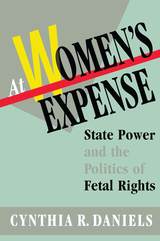
Some say the fetus is the “tiniest citizen.” If so, then the bodies of women themselves have become political arenas—or, recent cases suggest, battlefields. A cocaine-addicted mother is convicted of drug trafficking through the umbilical cord. Women employees at a battery plant must prove infertility to keep their jobs. A terminally ill woman is forced to undergo a cesarean section. No longer concerned with conception or motherhood, the new politics of fetal rights focuses on fertility and pregnancy itself, on a woman’s relationship with the fetus. How exactly, Cynthia Daniels asks, does this affect a woman’s rights? Are they different from a man’s? And how has the state helped determine the difference? The answers, rigorously pursued throughout this book, give us a clear look into the state’s paradoxical role in gender politics—as both a challenger of injustice and an agent of social control.
In benchmark legal cases concerned with forced medical treatment, fetal protectionism in the workplace, and drug and alcohol use and abuse, Daniels shows us state power at work in the struggle between fetal rights and women’s rights. These cases raise critical questions about the impact of gender on women’s standing as citizens, and about the relationship between state power and gender inequality. Fully appreciating the difficulties of each case, the author probes the subtleties of various positions and their implications for a deeper understanding of how a woman’s reproductive capability affects her relationship to state power. In her analysis, the need to defend women’s right to self-sovereignty becomes clear, but so does the need to define further the very concepts of self-sovereignty and privacy.
The intensity of the debate over fetal rights suggests the depth of the current gender crisis and the force of the feelings of social dislocation generated by reproductive politics. Breaking through the public mythology that clouds these debates, At Women’s Expense makes a hopeful beginning toward liberating woman’s body within the body politic.
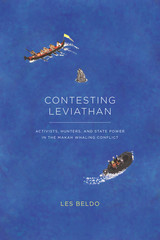
In Contesting Leviathan, anthropologist Les Beldo describes the complex judicial and political climate for whale conservation in the United States, and the limits of the current framework in which whales are treated as “large fish” managed by the National Marine Fisheries Service. Emphasizing the moral dimension of the conflict between the Makah, the US government, and antiwhaling activists, Beldo brings to light the lived ethics of human-animal interaction, as well as how different groups claim to speak for the whale—the only silent party in this conflict. A timely and sensitive study of a complicated issue, this book calls into question anthropological expectations regarding who benefits from the exercise of state power in environmental conflicts, especially where indigenous groups are involved. Vividly told and rigorously argued, Contesting Leviathan will appeal to anthropologists, scholars of indigenous culture, animal activists, and any reader interested in the place of animals in contemporary life.

Combining textual analyses of films, rap songs, and visual artworks; ethnographic material collected in Cuba; and insights into the nation’s history and political economy, Fernandes details the new forms of engagement with official institutions that have opened up as a result of changing relationships between state and society in the post-Soviet period. She demonstrates that in a moment of extreme hardship and uncertainty, the Cuban state has moved to a more permeable model of power. Artists and other members of the public are collaborating with government actors to partially incorporate critical cultural expressions into official discourse. The Cuban leadership has come to recognize the benefits of supporting artists: rappers offer a link to increasingly frustrated black youth in Cuba; visual artists are an important source of international prestige and hard currency; and films help unify Cubans through community discourse about the nation. Cuba Represent! reveals that part of the socialist government’s resilience stems from its ability to absorb oppositional ideas and values.


On a visit to eastern Hui'an in 1994, Sara Friedman was surprised to see a married woman reluctant to visit her conjugal home. The author would soon learn that this practice was typical of the area, along with distinctive female dress styles, gender divisions of labor, and powerful same-sex networks. These customs, she would learn, have long distinguished villages in this coastal region of southeastern China from other rural Han communities.
Intimate Politics explores these practices that have constituted eastern Hui'an residents, women in particular, as an anomaly among rural Han. This book asks what such practices have come to mean in a post-1949 socialist order that has incorporated forms of marriage, labor, and dress into a developmental scale extending from the primitive to the civilized. Government reform campaigns were part of a wholesale effort to remake Chinese society by replacing its "feudal" elements with liberated socialist ideals and practices. As state actors became involved in the intimate aspects of Huidong women's lives, their official models of progress were challenged by the diversity of local practices and commitment of local residents. These politicized entanglements have generated what the author calls "intimate politics," a form of embodied struggle in which socialist civilizing agendas—from the state-sponsored reforms of the Maoist decades to the market-based "reform and opening" of the post-Mao era—have been formulated, contested, and, in some cases, transformed through the bodies and practices of local women.
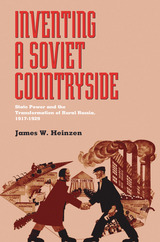
Following the largest peasant revolution in history, Russia's urban-based Bolshevik regime was faced with a monumental task: to peacefully “modernize” and eventually “socialize” the peasants in the countryside surrounding Russia's cities. To accomplish this, the Bolshevik leadership created the People's Commissariat of Agriculture (Narkomzem), which would eventually employ 70,000 workers. This commissariat was particularly important, both because of massive famine and because peasants composed the majority of Russia's population; it was also regarded as one of the most moderate state agencies because of its nonviolent approach to rural transformation.
Working from recently opened historical archives, James Heinzen presents a balanced, thorough examination of the political, social, and cultural dilemmas present in the Bolsheviks' strategy for modernizing of the peasantry. He especially focuses on the state employees charged with no less than a complete transformation of an entire class of people. Heinzen ultimately shows how disputes among those involved in this plan-from the government, to Communist leaders, to the peasants themselves-led to the shuttering of the Commissariat of Agriculture and to Stalin's cataclysmic 1929 collectivization of agriculture.

Powerful Frequencies details the central role that radio technology and broadcasting played in the formation of colonial Portuguese Southern Africa and the postcolonial nation-state, Angola. In Intonations, Marissa J. Moorman examined the crucial relationship between music and Angolan independence during the 1960s and ’70s. Now, Moorman turns to the history of Angolan radio as an instrument for Portuguese settlers, the colonial state, African nationalists, and the postcolonial state. They all used radio to project power, while the latter employed it to challenge empire.
From the 1930s introduction of radio by settlers, to the clandestine broadcasts of guerrilla groups, to radio’s use in the Portuguese counterinsurgency strategy during the Cold War era and in developing the independent state’s national and regional voice, Powerful Frequencies narrates a history of canny listeners, committed professionals, and dissenting political movements. All of these employed radio’s peculiarities—invisibility, ephemerality, and its material effects—to transgress social, political, “physical,” and intellectual borders. Powerful Frequencies follows radio’s traces in film, literature, and music to illustrate how the technology’s sonic power—even when it made some listeners anxious and frightened—created and transformed the late colonial and independent Angolan soundscape.
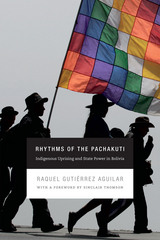
"In Rhythms of the Pachakuti we can sense the reverberations of an extraordinary historical process that took place in Bolivia at the start of the twenty-first century. The book is the product of Raquel Gutiérrez Aguilar's political engagement in that historical process. . . . Though of Mexican nationality, [she] was intimately involved in Bolivian politics for many years and acquired a quasi-legendary status there as an intense, brilliant activist and radical intellectual. . . . [Her account is] . . . itself a revolutionary document. . . . Rhythms of the Pachakuti deserves to stand as a key text in the international literature of radicalism and emancipatory politics in the new century."—Sinclair Thomson, from the foreword
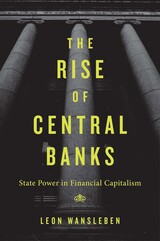
A bold history of the rise of central banks, showing how institutions designed to steady the ship of global finance have instead become as destabilizing as they are dominant.
While central banks have gained remarkable influence over the past fifty years, promising more stability, global finance has gone from crisis to crisis. How do we explain this development? Drawing on original sources ignored in previous research, The Rise of Central Banks offers a groundbreaking account of the origins and consequences of central banks’ increasing clout over economic policy.
Many commentators argue that ideas drove change, indicating a shift in the 1970s from Keynesianism to monetarism, concerned with controlling inflation. Others point to the stagflation crises, which put capitalists and workers at loggerheads. Capitalists won, the story goes, then pushed deregulation and disinflation by redistributing power from elected governments to markets and central banks. Both approaches are helpful, but they share a weakness. Abstracting from the evolving practices of central banking, they provide inaccurate accounts of recent policy changes and fail to explain how we arrived at the current era of easy money and excessive finance.
By comparing developments in the United States, the United Kingdom, Germany, and Switzerland, Leon Wansleben finds that central bankers’ own policy innovations were an important ingredient of change. These innovations allowed central bankers to use privileged relationships with expanding financial markets to govern the economy. But by relying on markets, central banks fostered excessive credit growth and cultivated an unsustainable version of capitalism. Through extensive archival work and numerous interviews, Wansleben sheds new light on the agency of bureaucrats and calls upon society and elected leaders to direct these actors’ efforts to more progressive goals.

O’Neill focuses on the creation of flood control programs along the lower Mississippi River and the Sacramento River, the first two rivers to receive federal flood control aid. She describes how, in the early to mid-nineteenth century, planters, shippers, and merchants from both regions campaigned for federal assistance with flood control efforts. She explains how the federal government was slowly and reluctantly drawn into water management to the extent that, over time, nearly every river in the United States was reengineered. Her narrative culminates in the passage of the national Flood Control Act of 1936, which empowered the Army Corps of Engineers to build projects for all navigable rivers in conjunction with local authorities, effectively ending nationwide, comprehensive planning for the protection of water resources.
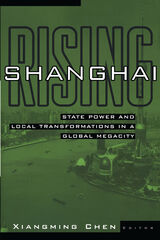

The U.S. Supreme Court increasingly matters in American political life when those across the political spectrum look at the Court for relief from policies they oppose and as another venue for advancing their own policy agendas. However, the evidence is mounting, to include this book in a big way, that courts are more of a sideshow to the culture war. While court decisions, especially Supreme Court decisions, do have importance, the decisions emanating from the Court reflect social, cultural, and political change that occurred long prior to their decision ever being made.
This book tests how much political and social change has been made primarily through Gerald Rosenberg’s framework from his seminal work, The Hollow Hope: Can Courts Bring About Social Change, but it also utilizes Daniel Elazar’s Political Culture Theory to explain state level variations in political and social change. The findings indicate that while courts are not powerless institutions, reformers will not have success unless supported by the public and the elected branches, and most specifically, that preexisting state culture is a determining factor in the amount of change courts make. In short, federalism still matters.


READERS
Browse our collection.
PUBLISHERS
See BiblioVault's publisher services.
STUDENT SERVICES
Files for college accessibility offices.
UChicago Accessibility Resources
home | accessibility | search | about | contact us
BiblioVault ® 2001 - 2024
The University of Chicago Press









